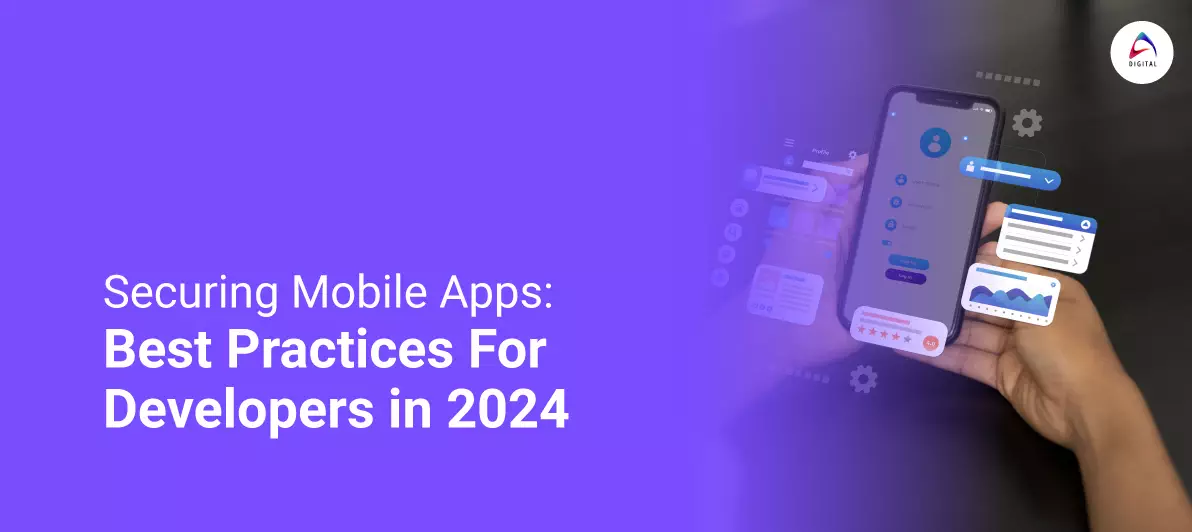Securing Mobile Apps: Best Practices For Developers in 2024

Mobile applications have become an integral part of our daily lives, powering everything from communication and entertainment to banking and healthcare. As the demand for mobile apps grows, so does the need to ensure their security. In 2024 and beyond, app developers must prioritize security more than ever, as the increasing sophistication of cyber threats can jeopardize both user data and business operations.
Let’s explore best practices for securing mobile apps, focusing on secure coding, using protected servers, modern encryption methods, strong authentication systems, regular testing and monitoring, the use of authorized APIs, and securing the app backend. These practices will not only help safeguard user data but also build trust and credibility in the application.
Best Practices For Developers in 2024
Secure Mobile App Coding
Secure mobile app coding refers to the practice of writing code that is resilient against security vulnerabilities and exploits. App developers should follow secure coding standards, regular code reviews can help identify and fix security issues early in the development process. Secure coding not only protects the application from hackers but also helps in maintaining user trust and safeguarding sensitive information.
Key Practices For Secure Coding:
- Input Validation: Always validate user inputs to prevent code injection attacks.
- Code Obfuscation: Use code obfuscation techniques to make it more difficult for attackers to reverse-engineer the app.
- Regular Code Reviews: Conduct regular code reviews to identify and fix security vulnerabilities early in the development cycle.
Use Protected Servers
Protected servers are essential for hosting and supporting secure mobile applications. These servers need to be configured with optimal security measures, including firewalls, anti-malware software, and intrusion detection systems. For a mobile app development company in Needham, MA, investing in protected servers is crucial for maintaining the security and integrity of the applications they develop and host.
Tips for Using Protected Servers:
- Secure Configurations: Ensure servers are configured securely with firewalls, anti-malware, and intrusion detection systems.
- Access Controls: Implement strict access controls to restrict unauthorized access to server resources.
- Regular Updates: Keep server software and operating systems up-to-date to protect against known vulnerabilities.
Use Encryption Methods
Modern encryption methods are vital for protecting sensitive data transmitted and stored by mobile applications. Employing SSL/TLS protocols for encrypting data in transit ensures that information remains confidential and secure between the app and the server. Utilizing advanced encryption techniques reassures users that their personal information is safe, thereby enhancing the credibility and reliability of the mobile application.
Best Practices for Encryption:
- Use SSL/TLS: Always use SSL/TLS protocols to encrypt data in transit.
- Encrypt Data at Rest: Use encryption to protect data stored on mobile devices and servers.
- Key Management: Implement effective key management practices to secure encryption keys.
Use Strong Authentication Systems
Authentication systems are critical for verifying user identities and safeguarding mobile applications against unauthorized access. Implementing strong authentication methods requires users to provide multiple pieces of evidence (e.g., passwords, fingerprints) to verify their identity. Emphasizing robust authentication systems builds user trust and enhances overall app security.
Effective Authentication Strategies:
- Multi-Factor Authentication (MFA): Require users to provide multiple forms of authentication, such as a password and a fingerprint.
- Biometric Authentication: Leverage biometric authentication methods, like facial recognition or fingerprint scanning, for added security.
- Session Management: Implement secure session management to prevent session hijacking.
Testing and Monitoring the App Regularly
Testing and monitoring apps regularly is an essential practice to identify and mitigate security vulnerabilities continuously. It helps uncover and address potential security flaws by simulating cyber-attacks. Consistent testing and monitoring ensure that the mobile application remains secure over time and adapts to new threats, safeguarding the app’s functionality and user data.
Important Testing and Monitoring Approaches:
- Penetration Testing: Conduct regular penetration testing to identify and exploit potential vulnerabilities.
- Automated Scanning: Use automated scanning tools to continuously check for security issues.
- Real-Time Monitoring: Implement real-time monitoring to detect and respond to security threats promptly.
Using Authorized APIs Only
APIs (Application Programming Interfaces) are integral to mobile app development for enabling various functionalities and integrations. However, using unauthorized or poorly designed APIs can expose the app to significant security risks. Relying on authorized and well-documented APIs minimizes vulnerabilities and enhances the overall security of the mobile application.
Guidelines for Using Authorized APIs:
- Use HTTPS: Ensure that all API communications occur over HTTPS to encrypt data.
- Authentication: Authenticate API calls using secure methods, such as OAuth.
- API Gateways: Use API gateways to manage and secure API traffic.
Securing the Mobile App Backend
The backend infrastructure is critical to your app’s functionality and security. A secure app backend is essential for maintaining the performance, reliability, and security of mobile applications, ensuring that they can withstand cyber threats and data breaches effectively.
Strategies to Secure the App Backend:
- Database Security: Use encryption and secure access controls to protect backend databases.
- Middleware Security: Implement security measures for any middleware components that the app uses.
- Regular Audits: Conduct regular security audits of the backend infrastructure to identify and remediate vulnerabilities.
Conclusion
In an era where cyber threats are constantly evolving, securing mobile applications must be a top priority for all app developers and businesses. By adhering to the best practices outlined above, you can ensure that your applications are robust, secure, and trusted by users. From secure coding and protected servers to modern encryption methods and strong authentication systems, each step is critical in building a secure mobile application.
At Aarna Digital Technologies, we specialize in providing secure mobile app development services in Needham, MA. Our commitment to leveraging the latest technology ensures that your applications are not only innovative but also resilient against security threats. Partner with us to elevate, innovate, and accelerate your mobile app development, keeping user data safe and your business thriving in the digital world.
Together, we can navigate the future of secure mobile app development and ensure your business thrives in an ever-evolving digital landscape. Reach out to Aarna Digital Technologies today and let us help you fortify your mobile app security strategy.

